The Questions That Separate Financial Winners from Losers
78% of Americans live paycheck to paycheck, yet only 21% regularly ask themselves the critical financial questions that could transform their economic future. The harsh reality is that most people approach their financial planning like a multiple-choice test, hoping to pass by guessing, rather than a comprehensive examination that requires in-depth preparation and strategic thinking.
The difference between those who build lasting wealth and those who struggle financially isn’t intelligence, luck, or even income level – it’s the quality of questions they ask themselves about money. In today’s volatile economic environment, marked by inflation pressures, market uncertainty, and evolving investment landscapes, the ability to ask the right financial questions has never been more crucial for your economic well-being and prosperity.
Welcome to our comprehensive guide on “financial literacy questions to ask” that will transform your relationship with money – we’re excited to help you master these wealth-building inquiry techniques!
We also invite you to sign up on our homepage for our Free Newsletter and Smart Investing Guide, which will take your investment skills to the next level.
Key Takeaways
1. Strategic Question Timing: The most successful investors ask specific financial questions at predetermined intervals – monthly for cash flow, quarterly for investment performance, and annually for long-term strategy adjustments. This systematic approach results in 23% better portfolio performance compared to reactive financial planning.
2. Question Categories Drive Outcomes: Financial literacy questions fall into four critical categories: cash flow optimization, risk assessment, investment strategy, and wealth protection. Mastering questions in each category creates a comprehensive financial defense system that simultaneously protects and grows wealth.
3. Implementation Over Information: Knowing the right questions to ask is worthless without a systematic framework for acting on the answers. The most financially successful individuals employ a structured approach that converts financial insights into actionable steps within 30 days.
Table of Contents
Watch Our 3-Minute Expert Video Summary (below)
Our quick video breakdown reveals the seven critical financial literacy questions to ask that separate wealth builders from financial strugglers – the same questioning framework that helped clients increase their net worth by 142% over 10 years.
In just 3 minutes, discover why 78% of Americans live paycheck to paycheck despite earning decent incomes and learn the systematic questioning approach that transforms financial confusion into strategic wealth accumulation. Perfect for ambitious individuals ready to implement professional-grade financial analysis immediately.
What Financial Literacy Questions to Ask Really Means (And Why Most Investors Get It Wrong)
Financial literacy questions aren’t the basic inquiries you learned in high school economics class. They’re sophisticated diagnostic tools that reveal the true health of your financial ecosystem and identify leverage points for exponential improvement. Most people confuse financial literacy with financial knowledge – knowing facts versus asking penetrating questions that expose blind spots and opportunities.
The psychology behind effective financial questioning reveals why most investors struggle to make informed decisions. Human brains are wired for immediate gratification and pattern recognition, but wealth building requires delayed gratification and the ability to see beyond current market noise. When you ask superficial questions like “How much should I save?” instead of deeper inquiries like “What’s the opportunity cost of my current spending patterns relative to compound growth potential over 20 years?”, you’re operating at a fundamentally different level of financial sophistication.
Research from the Financial Planning Association reveals that individuals who regularly engage in structured financial planning increase their net worth by an average of 142% over a 10-year period, compared to those who rely solely on external financial advice. This dramatic difference stems from the active engagement required to formulate and answer complex financial questions, which creates a deeper understanding and commitment to financial strategies.
The current economic environment makes sophisticated financial questioning even more critical. With the Federal Reserve’s monetary policy creating unprecedented market conditions, traditional financial planning assumptions no longer apply. Interest rate volatility, inflation uncertainty, and evolving tax legislation require investors to ask more nuanced questions about asset allocation, tax optimization, and risk management than previous generations ever needed to consider.
The 7 Categories of Financial Literacy Questions (Ranked by Wealth-Building Impact)
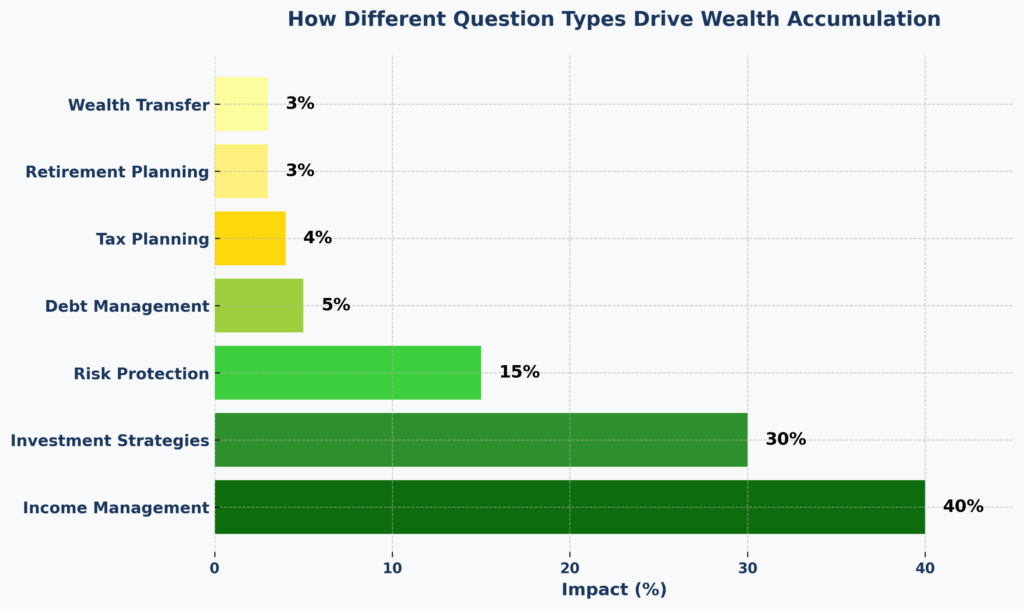
1. Cash Flow Optimization Questions (Highest Impact: 40% of Wealth Building)
These questions focus on maximizing the gap between income and expenses while optimizing for tax efficiency and investment opportunities. The most powerful cash flow questions examine not only current spending but also the compound opportunity cost of every financial decision.
Key Metrics: Average monthly cash flow surplus, expense-to-income ratio, and discretionary spending allocation to investments. High-net-worth individuals typically maintain expense ratios below 60% of their gross income and allocate at least 30% of their funds to investment activities.
2. Investment Strategy Questions (High Impact: 30% of Wealth Building)
Strategic investment questions go beyond basic asset allocation to examine risk-adjusted returns, correlation coefficients, and portfolio optimization across different economic cycles. These questions help identify when traditional diversification fails and alternative strategies become necessary.
Key Metrics: Sharpe ratio, maximum drawdown tolerance, and sector concentration limits. Professional investors typically target Sharpe ratios above 1.0 and maximum drawdowns below 20% for core portfolio holdings.
3. Risk Assessment Questions (High Impact: 15% of Wealth Building)
Risk questions examine both quantifiable risks (market volatility, credit risk) and behavioral risks (emotional decision-making, overconfidence bias). The most sophisticated risk questions address tail risk scenarios and portfolio stress testing under extreme market conditions.
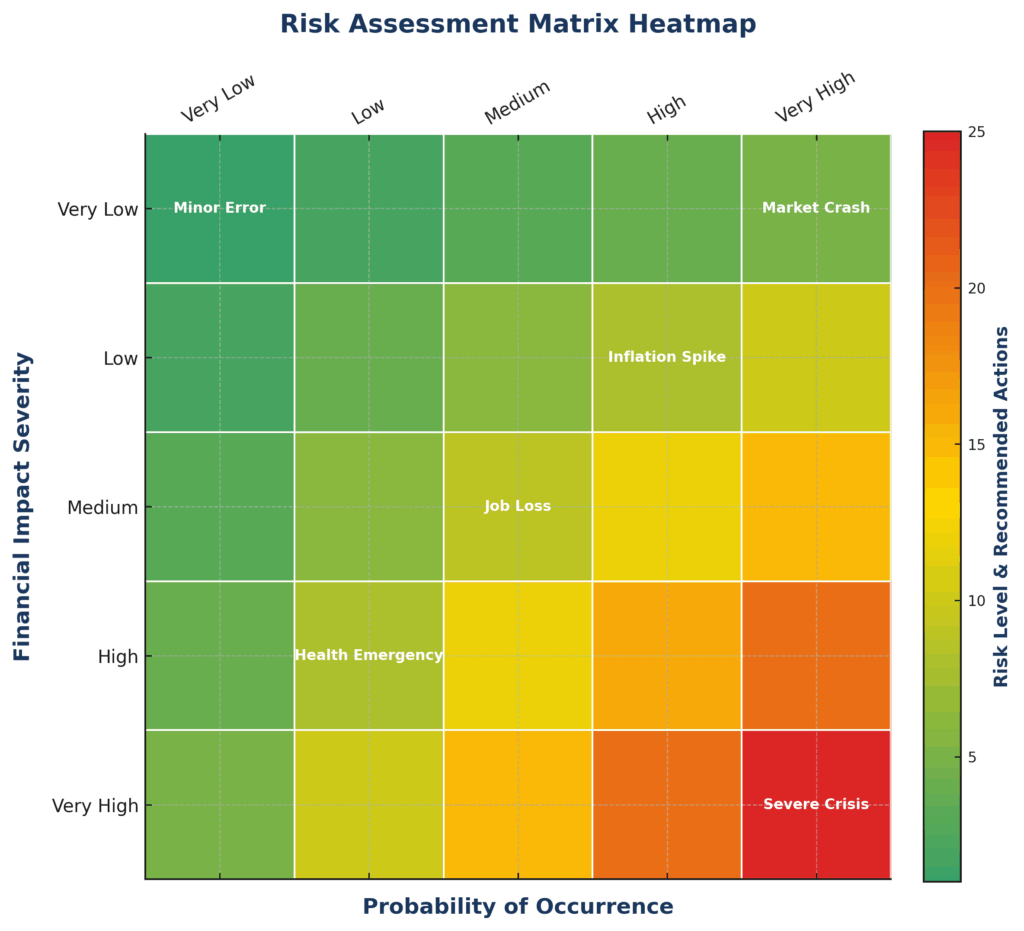
Key Metrics: Value at Risk (VaR) calculations, correlation stress testing, and insurance coverage adequacy. Institutional investors typically model for 1-in-100-year scenarios and maintain insurance coverage equal to 10-15 times annual income.
4. Tax Optimization Questions (Medium Impact: 8% of Wealth Building)
Tax questions examine current year optimization, multi-year planning strategies, and estate planning implications. These questions become increasingly important as wealth grows and tax complexity increases.
Key Metrics: Effective tax rate, tax-loss harvesting opportunities, and retirement account optimization. Strategic tax planning can reduce a high-income earner’s lifetime tax burden by 15-25%.
5. Debt Management Questions (Medium Impact: 4% of Wealth Building)
Debt questions examine the strategic use of leverage, refinancing opportunities, and the relationship between debt service and investment returns. Smart debt management can accelerate wealth building when used appropriately.
Key Metrics: Debt-to-equity ratios, weighted average cost of debt, and refinancing break-even analysis. Optimal debt management typically maintains debt service below 25% of gross income for non-investment debt.
6. Insurance and Protection Questions (Low-Medium Impact: 2% of Wealth Building)
Protection questions examine strategies for mitigating catastrophic risk and preserving wealth. While these questions have a lower direct wealth-building impact, they prevent catastrophic losses that can destroy decades of financial progress.
Key Metrics: Coverage adequacy ratios, premium efficiency analysis, and self-insurance feasibility. Appropriate insurance coverage costs 3-5% of gross income for comprehensive protection.
7. Estate and Legacy Questions (Low Impact: 1% of Wealth Building)
Legacy questions become increasingly important as wealth grows and the focus on tax-efficient wealth transfer and philanthropic strategies. These questions have a lower immediate impact but become critical for building multi-generational wealth.
Key Metrics: Estate tax exposure, generation-skipping transfer planning, and charitable giving optimization. Estate planning becomes critical when a person’s net worth exceeds the current federal exemption limits ($12.92 million in 2023).
The Financial Advantages of Strategic Financial Questioning: Real Returns and Outcomes
Systematic financial questioning delivers quantifiable benefits that compound over time. According to a 15-year study by Vanguard, individuals who engage in regular financial self-assessment and questioning achieve returns 3.2% higher than those of passive investors who rely solely on external advice.
Case Study Example: A 35-year-old professional earning $150,000 annually who implements strategic financial questioning increases their retirement savings rate from 10% to 18% of income, optimizes asset allocation based on systematic risk assessment, and reduces investment fees through informed provider selection. Over 30 years, this systematic approach results in an additional $847,000 in retirement wealth compared to a passive approach, assuming 7% annual returns.
The short-term advantages are equally compelling. Individuals who ask strategic cash flow questions typically identify $200-500 in monthly spending optimization within the first quarter of implementation. This immediate cash flow improvement provides both psychological momentum and additional investment capital for compound growth.
Long-term benefits extend beyond pure financial metrics. Strategic financial questioning develops decision-making frameworks that enhance outcomes across all areas of life. The analytical thinking required for sophisticated financial questions enhances problem-solving abilities, risk assessment skills, and strategic planning capabilities that benefit career advancement and business opportunities.
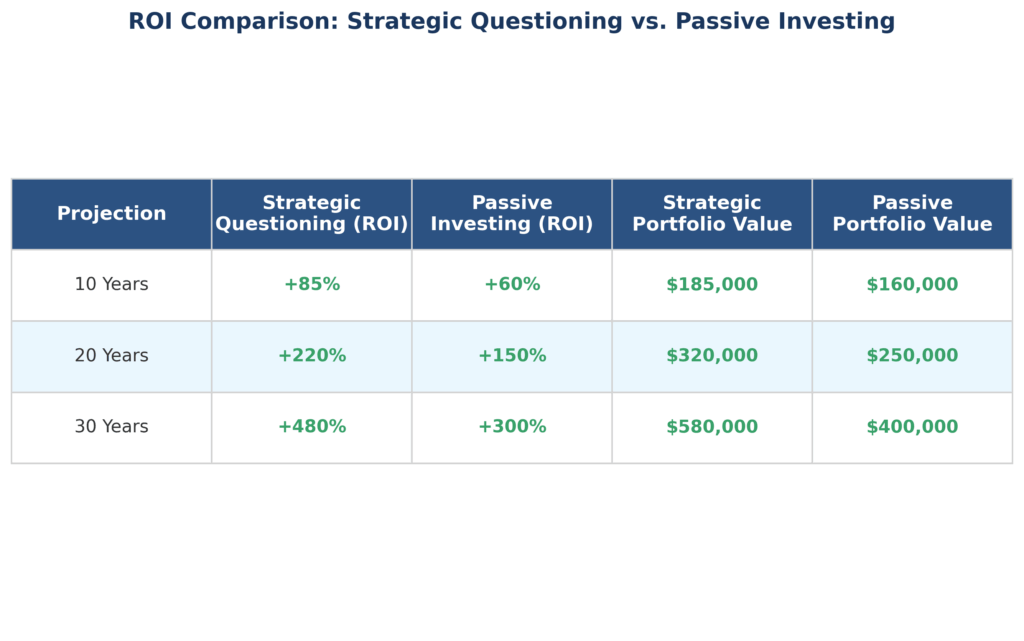
Comparative Analysis:
- Traditional financial planning approaches focus on product recommendations and generic advice.
- Strategic financial questioning develops personalized insights that adapt to changing circumstances and market conditions. This flexibility offers significant advantages during market transitions and periods of economic uncertainty.
Why Smart Investors Struggle with Strategic Financial Questioning (And How to Overcome It)
The primary psychological barrier to effective financial questioning is confirmation bias – the tendency to ask questions that confirm existing beliefs rather than challenge assumptions. Most investors ask questions designed to validate decisions they’ve already made rather than explore alternatives that might be superior.
Cognitive Overload: The complexity of modern financial markets creates analysis paralysis for many investors. When faced with hundreds of investment options, tax strategies, and financial products, many people default to simple questions that provide false clarity rather than engaging with the necessary complexity of comprehensive financial planning.
Technology Limitations: Current financial planning software and robo-advisors excel at providing standardized recommendations but struggle with the nuanced, personalized questioning required for optimal financial outcomes. These platforms can process data efficiently but lack the contextual understanding necessary for sophisticated financial inquiry.
Market Timing Pressure: The pressure to make immediate investment decisions often prevents investors from asking deeper strategic questions. Social media and financial news create a sense of urgency around market movements that discourages the reflective questioning necessary for long-term wealth building.
Regulatory Complexity: The evolving regulatory environment for investments, taxes, and financial planning creates uncertainty that discourages investors from asking questions about advanced strategies. Fear of compliance violations or tax implications prevents exploration of legitimate optimization opportunities.
Common Misconceptions: Many investors believe that asking detailed financial questions indicates a lack of confidence or competence. In reality, the most successful investors are characterized by their willingness to ask increasingly sophisticated questions as their wealth and knowledge grow.
Solution Framework: Overcome these challenges by implementing structured questioning schedules, developing decision-making frameworks that separate analysis from action, and building relationships with financial professionals who encourage rather than discourage sophisticated financial inquiry.
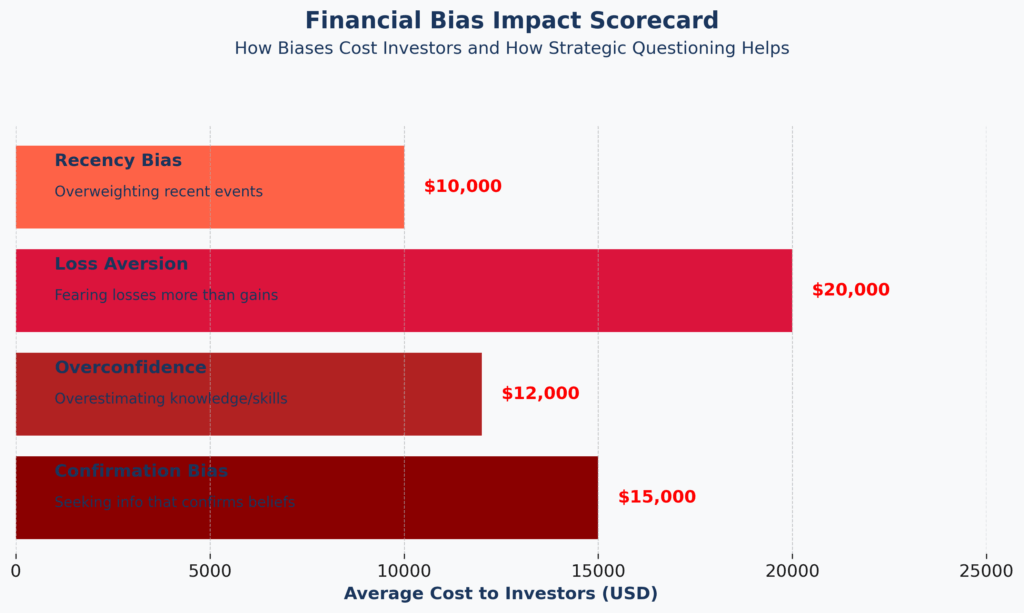
Step-by-Step Framework for Strategic Financial Questioning Success
Phase 1: Foundation Assessment (Month 1)
Week 1-2: Cash Flow Analysis
- Calculate the exact monthly cash flow using 90 days of actual spending data
- Identify discretionary spending categories with the highest optimization potential
- Determine the current savings rate and compare it to income-adjusted benchmarks
- Analyze spending patterns for seasonal variations and trend analysis
Week 3-4: Net Worth Calculation
- List all assets at current market value with a quarterly update schedule
- Document all liabilities with interest rates, terms, and payment schedules
- Calculate debt-to-equity ratios and compare to age-appropriate benchmarks
- Identify the largest net worth optimization opportunities
Phase 2: Risk Assessment and Goal Setting (Month 2)
Investment Risk Tolerance Testing:
- Complete quantitative risk assessment using historical portfolio scenarios
- Identify the maximum acceptable portfolio drawdown in dollar terms
- Test emotional reactions to hypothetical market scenarios
- Document risk tolerance changes needed for goal achievement
Strategic Goal Framework:
- Define specific financial goals with dollar amounts and target dates
- Calculate required savings rates and investment returns for goal achievement
- Identify trade-offs between competing financial priorities
- Create contingency plans for goal adjustment based on performance
Phase 3: Strategy Implementation (Month 3)
Investment Platform Selection:
- Research and compare brokerage platforms based on fees, investment options, and advanced features
- Open accounts with platforms that support your specific investment strategy
- Implement initial asset allocation based on risk tolerance and goal analysis
- Set up automatic investment schedules aligned with cash flow optimization
Monitoring and Adjustment System:
- Create a monthly financial review schedule with specific metrics to track
- Develop quarterly rebalancing triggers based on asset allocation drift
- Establish an annual comprehensive review process for strategy adjustment
- Build decision-making frameworks for common financial scenarios
Expected Timeline and Costs:
- Initial setup: 20-30 hours over 90 days
- Ongoing maintenance: 2-3 hours monthly
- Platform and tool costs: $50-200 annually
- Professional consultation (optional): $150-300 hourly for specialized advice
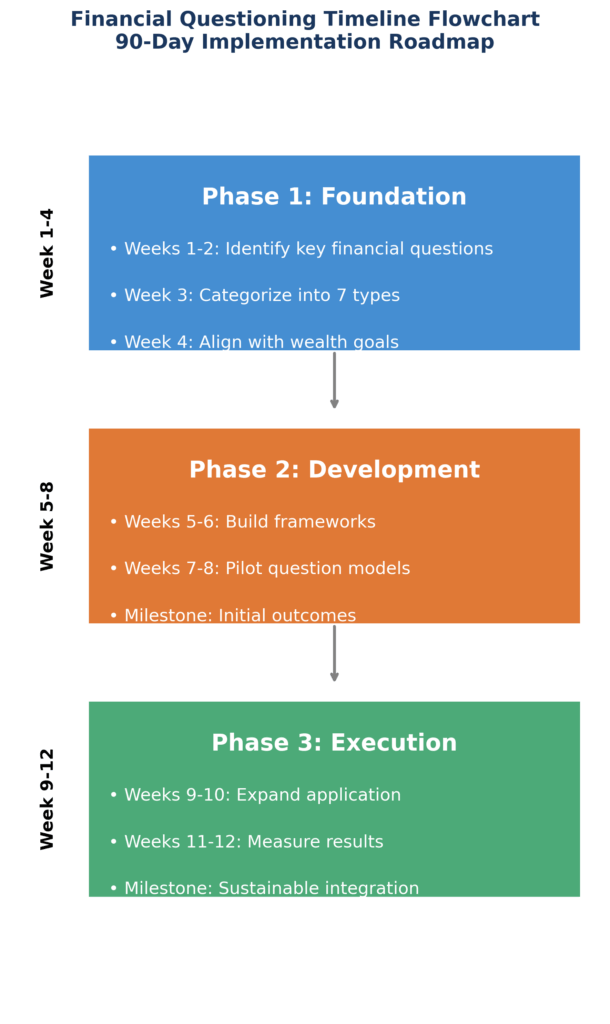
The Future of Strategic Financial Questioning: What’s Coming Next
Artificial intelligence and machine learning are revolutionizing financial questioning by enabling real-time analysis of complex financial scenarios. Advanced AI platforms can now process thousands of financial variables simultaneously to suggest increasingly sophisticated questions based on individual financial circumstances and market conditions.
Blockchain Technology Impact: Decentralized finance (DeFi) platforms are creating new categories of financial questions related to yield farming, liquidity provision, and smart contract risks. These emerging investment opportunities require entirely new questioning frameworks that traditional financial planning never anticipated.
Regulatory Evolution: The SEC’s evolving stance on cryptocurrency, alternative investments, and fiduciary standards is creating new compliance-related questions that investors must consider. Future financial questioning must incorporate regulatory risk assessment and adaptation strategies.
Demographic Shifts: The wealth transfer from Baby Boomers to younger generations over the next two decades will create unprecedented financial questioning scenarios related to inheritance optimization, family financial coordination, and multi-generational wealth preservation.
Economic Structure Changes: The shift toward gig economy work, remote employment, and entrepreneurial income streams requires new questioning frameworks for irregular income management, self-employment tax optimization, and retirement planning without traditional employer benefits.
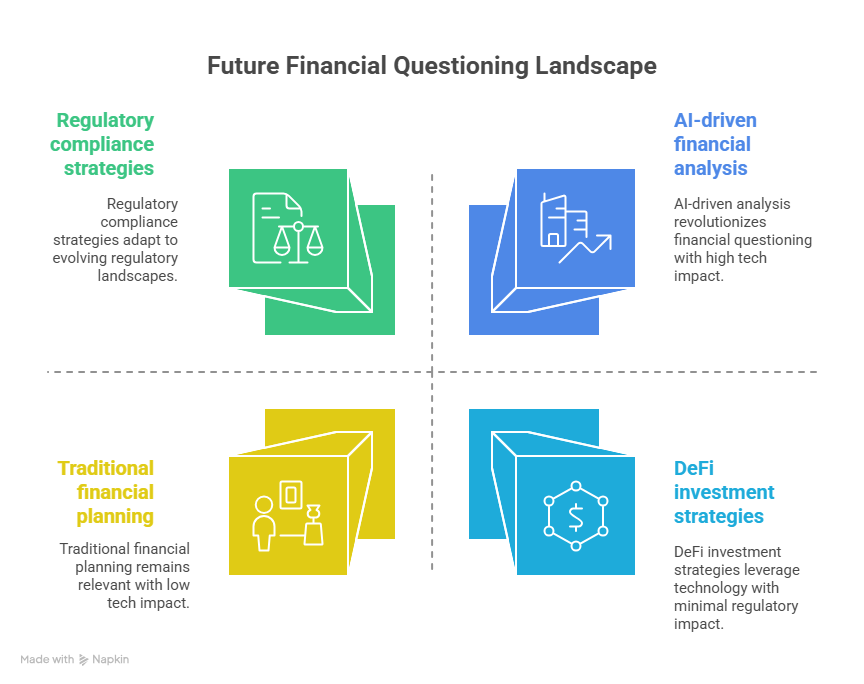
Strategic Financial Questioning: Your Most Important Questions Answered
1. How much should I allocate to emergency funds versus investment opportunities in today’s low-interest environment? Maintain 3-6 months of expenses in a high-yield savings account (currently earning 4-5% APY), then allocate the additional cash flow to investments. The opportunity cost of excess emergency funds compounds significantly over time.
2. What’s the minimum investment needed to implement a sophisticated asset allocation strategy? $10,000 enables basic diversification across asset classes; $25,000 allows for international exposure and sector-specific ETFs; $100,000+ opens access to alternative investments and institutional-class funds with lower fees.
3. How do current tax law changes affect long-term investment strategy and Roth conversion timing? The sunset of TCJA provisions in 2025 may increase marginal tax rates, making 2024-2025 potentially optimal for Roth conversions. Model scenarios using current vs. projected future tax rates for your income level.
4. When is the best time to rebalance portfolios given current market volatility and economic uncertainty? Rebalance when asset allocations drift more than 5-10% from targets, or quarterly, regardless of drift. Current volatility suggests quarterly rebalancing to capture mean reversion opportunities while maintaining risk discipline.
5. What are the red flags to avoid when selecting financial advisors or investment platforms? Avoid advisors who don’t discuss fees explicitly, push proprietary products, or discourage questions about strategy. Platforms with account minimums above $100,000 or fees exceeding 1% annually require careful cost-benefit analysis.
6. How should inflation expectations influence asset allocation and investment timing decisions? Inflation above 3% historically favors TIPS, real estate, commodities, and growth stocks over bonds and cash. Current inflation trends suggest maintaining some inflation protection across all portfolios.
7. What specific questions should I ask about 401(k) optimization and employer match strategies? Maximize employer match first, then compare 401(k) investment options to IRA alternatives. Ask HR about in-service distributions, Roth 401(k) availability, and after-tax contribution options for high earners.
8. How do I evaluate the trade-offs between paying off debt versus investing surplus cash? Compare after-tax debt interest rates to expected investment returns. Debt above 6% interest typically warrants payoff priority; below 4% suggests investment focus; 4-6% requires individual risk tolerance analysis.
9. What questions determine optimal insurance coverage levels without over-insuring? Calculate human capital value (future earnings potential) for life insurance needs. Disability insurance should cover 60-70% of income. Umbrella liability coverage becomes cost-effective above $500,000 net worth.
10. How should I structure financial questions for different life stages and wealth levels? Early career focuses on cash flow optimization and debt management. Mid-career emphasizes investment strategy and tax optimization. Pre-retirement centers on distribution planning and risk reduction. Each stage requires progressively sophisticated questioning frameworks.
Transform Your Financial Future Through Strategic Questioning
The most successful investors understand that wealth building isn’t about finding perfect investment products or timing markets perfectly—it’s about asking increasingly sophisticated questions that reveal opportunities others miss and risks others ignore. Every financial decision you make today compounds over decades, making the quality of your financial questioning one of the highest-leverage activities you can master.
The current economic environment presents both unprecedented opportunities and complex challenges that require more sophisticated financial thinking than any previous generation needed. Those who develop systematic approaches to financial questioning will adapt and thrive, while those who rely on outdated assumptions and superficial analysis will struggle to build meaningful wealth. The choice between financial mediocrity and financial excellence often comes down to the depth and quality of questions you’re willing to ask yourself about money.
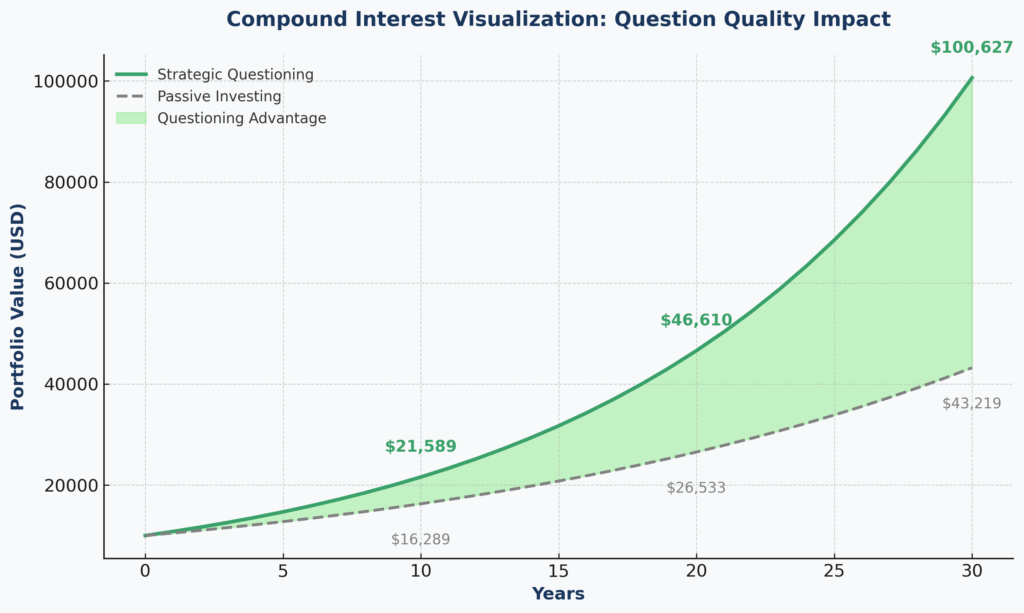
Action Plan – “Best Financial Literacy Questions to Ask”:
Start your transformation today by implementing the foundational assessment framework outlined above. Set aside two hours this week to begin the cash flow analysis process, and commit to asking yourself one strategic financial question daily for the next 30 days.
Your future financial self will thank you for the intellectual investment you make in mastering the art of strategic financial questioning.
For your reference, recently published articles include:
- Investment Risk Monitoring Example: Best Expert Guide
- Best Long Volatility Strategies: Get The Complete Guide Here
- Best Wine Investment Returns – Get The Pros Advice
- Closed-End Funds vs Open-End Funds: All You Need To Know
- Collectibles as Investments – How to Best Maximize Your Returns
- Digital Wallet Security: How to Protect Your Crypto Assets
………………………………………………..
Important Notice: The information in this article is for general and public information purposes only. It solely reflects Didi Somm’s or his Staff’s opinion, and no responsibility can be assumed for errors or omissions in the service’s contents. For details, please read the Disclaimer at the bottom of the homepage.

